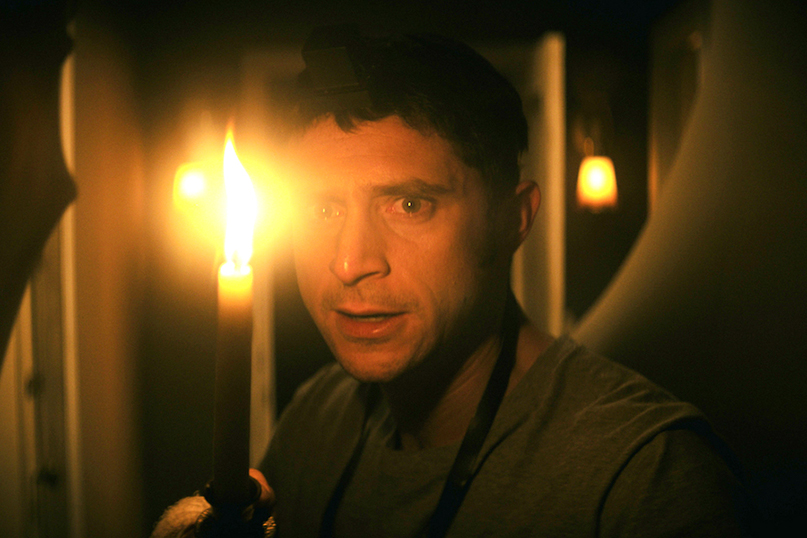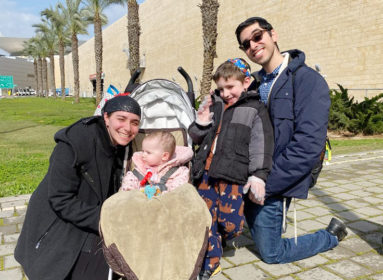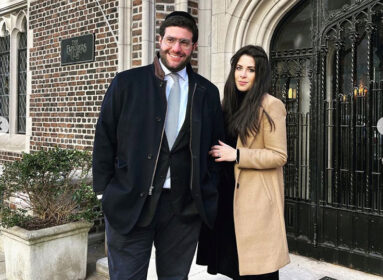
By Gabe Friedman
(JTA) – When Keith Thomas set out to write and direct a Jewish horror movie, he knew he wanted to go beyond the two most well known Jewish monsters.
Golems, creepy creatures usually formed out of mud or clay found in Jewish stories, were played out, he thought. So were dybbuks, a type of ghostly spirit mentioned in Jewish mythology. So he drew on what he learned from writing a master’s thesis about Jewish monsters at Hebrew Union College over a decade ago and turned to a lesser-known demon: the mazzik.
In “The Vigil,” Thomas’ directorial debut, a mazzik provides the spooks for one of the most uniquely Jewish mainstream horror films ever made. The movie hit home streaming platforms on Friday, Feb. 26.
Mazziks are invisible, low-level demons that, Thomas explains, were created with little “sparks of life” left over from the days of creation.
“Animals have a spark of life in a body, and then a little tiny bit of a soul. And the more advanced the animal gets, the larger the soul pieces, until you get humanity, which has a spark of life, a soul and a body. Demons are entities that have a spark of life, no body, and no soul,” he said. “They’re not malicious in the sense that they’re necessarily out to get us, it’s more that if you encounter one of them, it can be dangerous.”
In the film, that encounter comes through a Jewish ritual that shares some elements with horror stories even under ordinary circumstances. The story centers on a young ex-Hasidic man named Yakov who is struggling to find his way in secular society. In desperate need of some money, unemployed Yakov agrees to spend a night as a “shomer,” watching over the body of a recently deceased old man in an apartment in an Orthodox neighborhood of Brooklyn. Yakov begins to perceive strange sounds and movements, leaving him to wonder whether his anxiety medication is making him hallucinate. Eventually, he is forced to confront the source of evil torturing the house.
Thomas uses the words “distorted memory” and “trauma” often in talking about his film, which – without giving too much away – is rooted in the generational aftereffects of the Holocaust.
“Trauma is kind of like these ripples on the surface of water – you drop a giant rock and you’re going to get all these ripples. But even a tiny pebble has ripples. And so what I was interested in was how one man’s trauma, even just for 30 seconds – just an event that takes 30 seconds – can impact the rest of his life,” Thomas said about a moment the dead man in the film had experienced during the Holocaust.
Yakov (played by Dave Davis, a Jewish actor who has appeared in shows such as “The Walking Dead” and “True Detective”) is a trauma victim himself, having endured violent antisemitism on the street as a member of Brooklyn’s haredi Orthodox community, and an intense family tragedy stemming from that. He is also a member of a group fashioned after Footsteps, a real organization that helps transition people from the haredi world into broader society. The film’s first scene mimics a meeting of Footsteps members in conversation with a counselor, and all of the actors in it are real Footsteps alumni.
Keeping things authentic was challenging. Thomas knew bringing his large crew into haredi neighborhoods in Borough Park and Williamsburg would be disruptive, so the team set up real Orthodox rabbis around the perimeter of the set to explain the movie to passersby.
Several members of the cast – including Menashe Lustig– also feature in the Netflix series “Unorthodox.” Even the soundtrack has Orthodox influence – the “neo-Hasidic” band Zusha provided a song for the closing credits.
The product is unlike anything else in its genre – a mix of Jewish ritual, yiddishkeit, and gripping indie horror. Jason Blum, the Jewish producer behind the influential Blumhouse company, which has helped make horror films such as “Get Out,” “Paranormal Activity,” and many many, excitedly jumped on the film, in part because of its Jewish themes. Thomas said he and Blum have talked about the potential of a whole Jewish horror subset genre, which could build off of the popularity of Jewish themes in recent mainstream film and TV. Beyond the realm of ultra-Orthodox tradition, Thomas said the world of mysticism and kabbalah is ripe for the horror treatment.
In fact, Thomas, who is 45 and on his third career – he started out on the track to become a Jewish day school educator and then conducted clinical medical research – is currently working on another Jewish-themed horror flick. That’s after a remake he is working with Blumhouse on of “Firestarter,” a Stephen King story that was made into a 1984 film.
Thomas was mum on whether his new film would feature Orthodox Jews, but he agreed that viewers are fascinated by them.
“People are very interested in cultures that they’re not that familiar with. And I think the ultra-Orthodox in New York in particular are fascinating. Because they are living in the biggest city in the United States, they’re in the middle of like this cultural capital surrounded by the most advanced tech and booming industries, and yet they live this sort of very 19th-century lifestyle in the middle of the city,” he said. “[People] are also kind of fascinated by a religious community that lives according to certain doctrines. … They’re living in a very different sort of path.”
He wouldn’t say whether a mazzik would feature in his future movies. But he said that even though Judaism lacks a hellish “birthing place” for demons, there is room for more horror to be made out of its traditions.
“It’s not a very superstitious religion overall,” Thomas said. “But I still think there’s definitely room to mine material from it.”
Main Photo: Dave Davis as Yakov Ronen in “The Vigil.” (Courtesy of IFC Midnight)








 Southern New England Jewish Ledger
Southern New England Jewish Ledger










